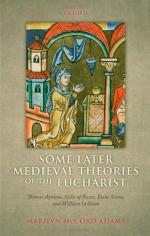|
This section contains 4,454 words (approx. 15 pages at 300 words per page) |

|
SOURCE: "Ockham on Human and Divine Freedom," Franciscan Studies, Vol. 38, 1978, pp. 122-32.
In the following excerpt, Clark explores Ockham's descriptive definition of causality.
Toward the end of its vital life, Scholasticism seemed to lapse into a painful second childhood. The very possibility of Scholastic theology was again questioned—this time by the uncompromising philosophy of Latin Averroism. The Parisian Statutes of 1270 and 1277 tried to legislate an alliance between reason and faith but only added to the confusion.1 Early heresies returned to trouble the old age of Scholasticism; a subtle form of Pelagianism, for example, was debated seriously in the 14th century. But above all, the political influence attached to types of scholastic discourse such as Thomism and Scotism came to have a disruptive effect. The battle for prestige between universities and teaching orders developed too often into predictable and counterproductive arguments, and finally, into harsh forms of intellectual...
|
This section contains 4,454 words (approx. 15 pages at 300 words per page) |

|


